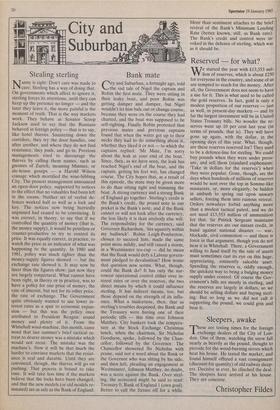Reserved — for what?
We started the year with £13,553 mil- lion of reserves, which is about £250 for everyone in the country, and some of us are tempted to reach for the money. After all, the Government does not seem to have a use for it. This is what used to be called the gold reserves. In fact, gold is only a modest proportion of our reserves — just as well, in present-day markets — and by far the largest investment will be in United States Treasury bills. No wonder the re- serves went up 10 per cent last year (in terms of pounds, that is). They will have gone up again, with the dollar, in the opening days of this year. What, though, are these reserves reserved for? They used to be a defence-line for sterling. We could buy pounds when they were under press- ure, and sell them (standard euphemism: `Take in dollars for the reserves') when they were popular. Gone, though, are the days when hundreds of millions of reserves would be sent over the top in Somme-like massacres, or, more elegantly, be hidden in ambush to spring out upon unwary sellers, forcing them into ruinous retreat. Orders nowadays forbid anything more than a modest tactical patrol, and we do not need £13,553 million of ammunition for that. Sir Patrick Sergeant maintains that the reserves are our instant credit, in hand against national disaster — war, blockade, civil commotion — and there is force in that argument, though you do not hear it in Whitehall. There, a Government willing to fund itself by the sale of assets must sometimes cast its eye on this huge, appreciating, eminently saleable asset. Spending the reserves is, oddly enough, the quickest way to bring a bulging money supply under control. Of course the Gov- ernment's bills are mostly in sterling, and the reserves are largely in dollars, so we should be selling dollars and buying sterl- ing. But so long as we did not call it supporting the pound, we could grin and bear it.










































 Previous page
Previous page